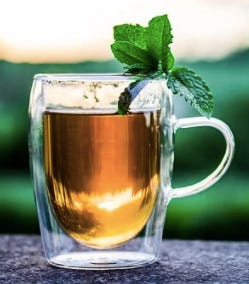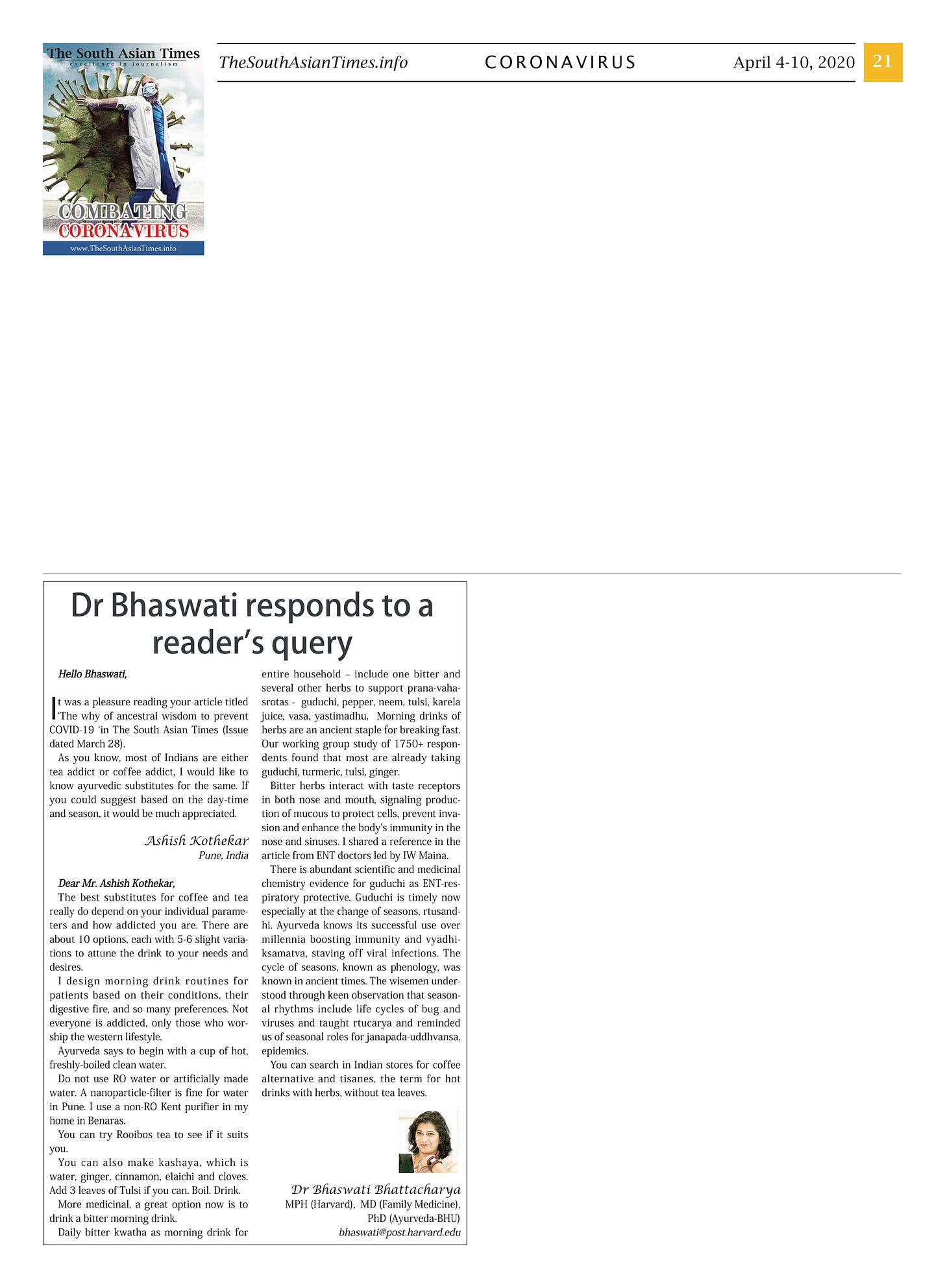Coffee, tea or herbs?
Morning drinks of herbs are an ancient staple for breaking fast… I design morning drink routines for patients based on their conditions, their digestive fire, and so many preferences.
Hello Bhaswati,
It was a pleasure reading your article titled ʻThe why of ancestral wisdom to prevent COVID‐19 ʻin The South Asian Times (Issue dated March 28).
As you know, most of Indians are either tea addicts or coffee addicts, I would like to know ayurvedic substitutes for the same. I understand that suggestions will be based on each individual but in general, I would like to know, what are the best drinking substitutes for coffee and tea.
If you could suggest based on the day-time and season, it would be much appreciated.
Cheers,
Ashish Kothekar
Pune, India
Dear Mr. Ashish Kothekar,
The best substitutes for coffee and tea really do depend on your individual parameters and how addicted you are. There are about 10 options, each with 5-6 slight variations to attune the drink to your needs and desires.
I design morning drink routines for patients based on their conditions, their digestive fire, and so many preferences. Not everyone is addicted, only those who worship the western lifestyle.
Ayurveda says to begin with a cup of hot, freshly-boiled clean water.
Do not use RO water or artificially made water. A nanoparticle-filter is fine for water in Pune. I use a non-RO Kent purifier in my home in Benaras.
You can try Rooibos tea to see if it suits you.
You can also make kashaya, which is water, ginger, cinnamon, elaichi-cardamom, and cloves. Add 3 leaves of Tulsi if you can. Boil. Drink. More medicinal, a great option now is to drink a bitter bitter morning drink.
Daily bitter kwatha as morning drink for entire household – include one bitter and several other herbs to support prana-vaha-srotas - guduchi, pepper, neem, tulsi, karela juice, vasa, yastimadhu. Morning drinks of herbs are an ancient staple for breaking fast. Our working group study of 1750+ respondents found that most are already taking guduchi, turmeric, tulsi, ginger.
Bitter herbs interact with taste receptors in both nose and mouth, signaling production of mucous to protect cells, prevent invasion and enhance the body's immunity in the nose and sinuses. I shared a reference in the article from ENT doctors led by IW Maina.
There is abundant scientific and medicinal chemistry evidence for guduchi as ENT-respiratory protective. Guduchi is timely now especially at the change of seasons, rtusandhi. Ayurveda knows its successful use over millenia boosting immunity and vyadhi-ksamatva, staving off viral infections. The cycle of seasons, known as phenology, was known in ancient times. The wisemen understood through keen observation that seasonal rhythms includes life cycles of bug and viruses and taught rtucarya and reminded us of seasonal roles for janapada-uddhvansa, epidemics.
You can search in Indian stores for coffee alternative and tisanes, the term for hot drinks with herbs, without tea leaves.
Regards, Dr. Bhaswati
wk2. column TheSouthAsianTimes
Obtain a pdf version of this column by clicking on the following image:
Dr. Bhaswati Bhattacharya is a Fulbright Specialist 2018‐2023 in Public Health. She serves as Clinical Asst Professor of Family Medicine in the Department of Medicine at Weill Cornell Medical College in New York, NY. Her bestselling book Everyday Ayurveda is published by Penguin Random House. To order an autographed copy, write to bhaswati@post.harvard.edu .





